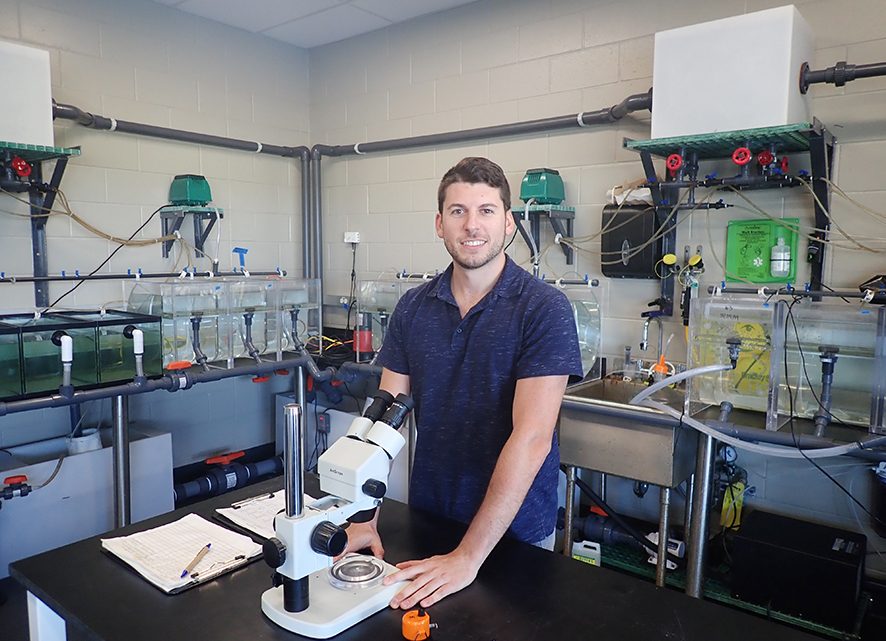UF Researchers Team Up with Florida Aquarium for NOAA Project, Part of Coral Reef Restoration Initiative
By: Kim Scotto-Kelley, (352) 294-7018, [email protected]
APOLLO BEACH, Fla. — Researchers at the University of Florida, in partnership with The Florida Aquarium, have discovered a novel method of culturing long-spined sea urchins, a species that is ecologically vital to the Florida Keys’ vulnerable coral reefs.
Scientists from the UF Institute of Food and Agricultural Sciences (UF/IFAS) and Aquarium biologists will breed these urchins for use in the “Mission: Iconic Reefs” project, a multi-partner coral reef restoration initiative announced today by the National Oceanic and Atmospheric Administration (NOAA).
Aaron Pilnick, a Ph.D. student in the UF/IFAS College of Agricultural and Life Sciences’ School of Natural Resources and Environment, and his adviser Joshua Patterson, assistant professor of restoration aquaculture in the UF/IFAS School of Forest Resources and Conservation, say that restoring diminished populations of the urchin, scientifically known as Diadema antillarum, is crucial to reviving coral reefs in the Keys. In the early 1980s, approximately 97% of the Diadema found in the Caribbean died due to a mysterious disease.
“The consequences of this die-off event were massive,” said Pilnick, who studies interdisciplinary ecology. “As one of the primary reef-grazing herbivores, Diadema are responsible for consuming algae; when they disappeared, there was a coinciding decline in coral cover as algae began to grow unchecked.”
Unfortunately, Diadema populations have never recovered. However, Pilnick and Patterson, based out of the Florida Aquarium’s Center for Conservation in Apollo Beach, plan to change that. Their research, funded by the Aquarium and UF, led to the largest captive Diadema culture in 2019.
“The marriage of the University of Florida’s research prowess and The Florida Aquarium’s aquarist expertise and infrastructure has created the necessary environment to ‘crack the code’ on Diadema aquaculture,” said Amber Whittle, director of conservation at The Florida Aquarium. “This partnership is vital to herbivore restoration on the Florida Reef Tract.”
Diadema are notoriously difficult to work with – their larvae are physically fragile, very sensitive to pollution in the water, and have a long developmental period of 40 or more days. Pilnick designed and built a novel aquaculture system that could cater to the urchin’s every need, including diet, water quality and habitat preferences.
“We start the culture process by spawning and collecting microscopic reproductive cells from adult Diadema and closely follow and monitor their development through to adulthood,” Pilnick said. “After working on this project for over a year we finally had a successful run producing 100 juvenile urchins this June, which was incredibly exciting and a huge step forward for our research program.”
Pilnick knows how important coral ecosystems are to Florida’s economy, but also has a more personal passion behind his research.
“I grew up fishing and diving in the Florida Keys and even taught scuba diving in Key Largo,” Pilnick said. “Now I feel compelled to try and fix some of the problems we are dealing with there
so that future generations can enjoy what this truly special place is all about.”
For more information about “Mission: Iconic Reefs,” visit fisheries.noaa.gov/southeast/habitat-conservation/restoring-seven-iconic-reefs-mission-recover-coral-reefs-florida-keys.
[livemarket market_name="KONK Life LiveMarket" limit=3 category=“” show_signup=0 show_more=0]


No Comment